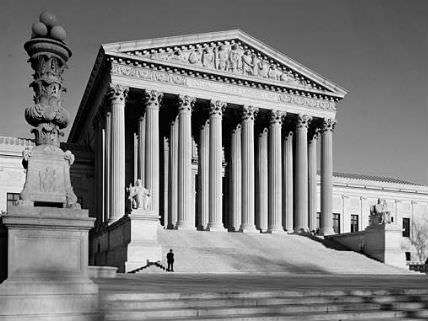This SCOTUS Precedent Is Bad News for Trump's Emergency Border Wall Declaration
"Extraordinary conditions do not create or enlarge constitutional power."

It was a stark choice for the U.S. Supreme Court. On one side was the president of the United States, a grasping figure happy to bypass the usual checks and balances and enact his political agenda via executive order. On the other side was a foundational principle of constitutional governance; namely, that even in the face of a national emergency, the executive may not wield those powers that the Constitution has granted to the legislature.
I am referring, of course, to the landmark 1935 case of Schechter Poultry Corp. v. United States. At issue was whether Congress had illegally delegated lawmaking authority to President Franklin Roosevelt when it passed the National Industrial Recovery Act (NIRA) of 1933. That sweeping law represented the New Deal's most significant attempt to centrally plan the American economy during the Great Depression. One of the problems with the NIRA was that it authorized Roosevelt to take all sorts of unilateral executive actions, effectively making him a lawmaking power unto himself. (The Schechter case also asked whether the NIRA violated the Commerce Clause.)
Writing for a 9-0 Court, Chief Justice Charles Evans Hughes ruled the NIRA to be a flatly unconstitutional delegation of lawmaking power to the president. "The Congress," Hughes observed, "is not permitted to abdicate or to transfer to others the essential legislative functions with which it is thus vested."
Which brings us to President Donald Trump and his much-discussed emergency declaration to secure border wall funding. Just like Roosevelt, Trump is now seeking to wield powers that the Constitution has not granted to him.
If you ask Trump or his supporters, they will tell you that the declaration is perfectly lawful under a federal statute known as the National Emergencies Act of 1976, which authorizes the president to take various actions if he deems them to be necessary. Granted, that regrettable federal law is something of a blank check to the president.
But the National Emergencies Act cannot supplant the Constitution. And according to Article I, Section 8, the federal spending power rests in the hands of Congress. Yet here we have Trump trying to claim the federal spending power for himself. To make matters worse, Trump is only doing so after Congress explicitly refused to authorize the level of spending that he wanted. That's a clear attack by Trump on the separation of powers.
So forget the National Emergencies Act. As the Supreme Court made clear in its Schechter precedent way back in 1935, "extraordinary conditions do not create or enlarge constitutional power."


Show Comments (125)